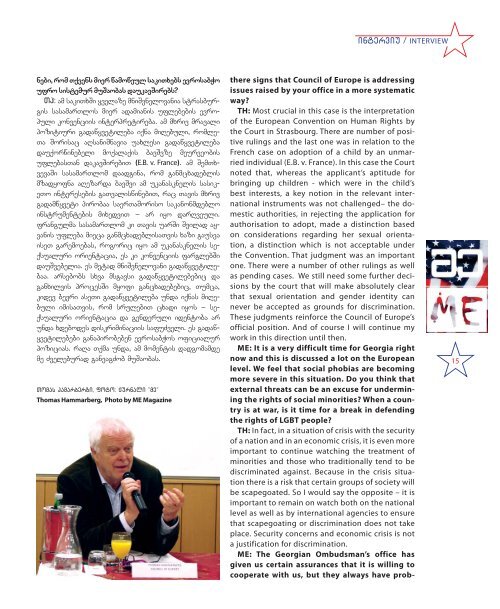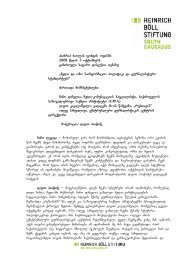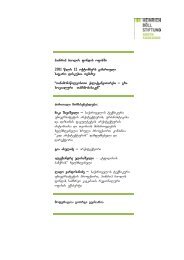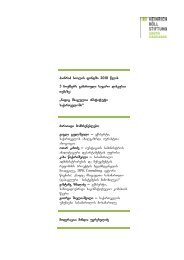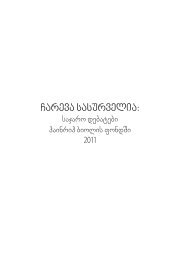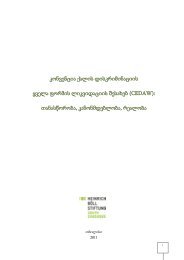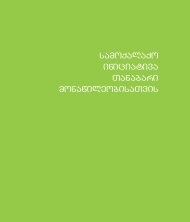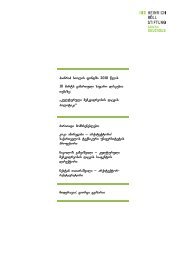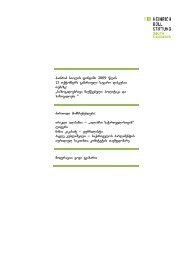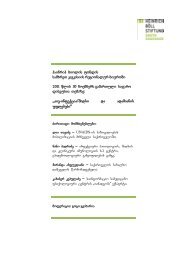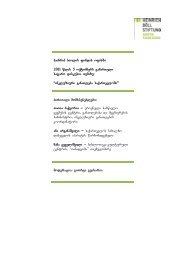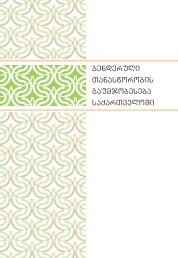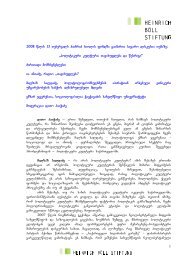HIV infection/AIDS”, posed a terrible threat to humankind. The panic
HIV infection/AIDS”, posed a terrible threat to humankind. The panic
HIV infection/AIDS”, posed a terrible threat to humankind. The panic
Create successful ePaper yourself
Turn your PDF publications into a flip-book with our unique Google optimized e-Paper software.
nebi, rom Tqvens mier wamoweul sakiTxebs evrosabWo<br />
ufro sistemur muSaobas daukavSirebs?<br />
Th: am sakiTxSi yvelaze mniSvnelovania strasburgis<br />
sasamarTlos mier adamianis uflebebis evropuli<br />
konvenciis interpretireba. am mxriv mravali<br />
pozitiuri gadawyvetileba iqna miRebuli, romle-<br />
Ta Sorisac aRsaniSnavia uaxlesi gadawyvetileba<br />
dauqorwinebeli moqalaqis bavSvze meurveobis<br />
uflebasTan dakavSirebiT (E.B. v. France). am SemTxvevaSi<br />
sasamarTlom daadgina, rom ganmcxadeblis<br />
mzadyofna aRezarda bavSvi am ukanasknelis sasikeTo<br />
interesebis gaTvaliswinebiT, rac Tavis mxriv<br />
gadamwyveti pirobaa saerTaSoriso sakanonmdeblo<br />
instrumentebis mixedviT _ ar iyo darRveuli.<br />
frangulma sasamarTlom ki Tavis uarSi Svilad ayvanis<br />
ufleba mieca ganmcxadeblisaTvis xazi gausva<br />
iseT garemoebas, rogoric iyo am ukanasknelis seqsualuri<br />
orientacia, es ki konvenciis farglebSi<br />
dauSvebelia. es metad mniSvnelovani gadawyvetilebaa.<br />
arsebobs sxva msgavsi gadawyvetilebebic da<br />
ganxilvis procesSi myofi gancxadebebic, Tumca,<br />
kidev bevri aseTi gadawyvetileba unda iqnas miRebuli<br />
imisaTvis, rom srulebiT cxadi iyos _ seqsualuri<br />
orientacia da genderuli iden<strong>to</strong>ba ar<br />
unda xdebodes diskriminaciis safuZveli. es gadawyvetilebebi<br />
ganapirobeben evrosabWos oficialur<br />
pozicias. raRa Tqma unda, am momentis dadgomamde<br />
me Zveleburad ganvagZob muSaobas.<br />
Tomas hamarbergi, fo<strong>to</strong>: Jurnali "me"<br />
Thomas Hammarberg, Pho<strong>to</strong> by ME Magazine<br />
interviu / INTERVIEW<br />
there signs that Council of Europe is addressing<br />
issues raised by your office in a more systematic<br />
way?<br />
TH: Most crucial in this case is the interpretation<br />
of the European Convention on Human Rights by<br />
the Court in Strasbourg. <strong>The</strong>re are number of positive<br />
rulings and the last one was in relation <strong>to</strong> the<br />
French case on adoption of a child by an unmarried<br />
individual (E.B. v. France). In this case the Court<br />
noted that, whereas the applicant’s aptitude for<br />
bringing up children - which were in the child’s<br />
best interests, a key notion in the relevant international<br />
instruments was not challenged– the domestic<br />
authorities, in rejecting the application for<br />
authorisation <strong>to</strong> adopt, made a distinction based<br />
on considerations regarding her sexual orientation,<br />
a distinction which is not acceptable under<br />
the Convention. That judgment was an important<br />
one. <strong>The</strong>re were a number of other rulings as well<br />
as pending cases. We still need some further decisions<br />
by the court that will make absolutely clear<br />
that sexual orientation and gender identity can<br />
never be accepted as grounds for discrimination.<br />
<strong>The</strong>se judgments reinforce the Council of Europe’s<br />
official position. And of course I will continue my<br />
work in this direction until then.<br />
ME: It is a very difficult time for Georgia right<br />
now and this is discussed a lot on the European<br />
level. We feel that social phobias are becoming<br />
more severe in this situation. Do you think that<br />
external <strong>threat</strong>s can be an excuse for undermining<br />
the rights of social minorities? When a country<br />
is at war, is it time for a break in defending<br />
the rights of LGBT people?<br />
TH: In fact, in a situation of crisis with the security<br />
of a nation and in an economic crisis, it is even more<br />
important <strong>to</strong> continue watching the treatment of<br />
minorities and those who traditionally tend <strong>to</strong> be<br />
discriminated against. Because in the crisis situation<br />
there is a risk that certain groups of society will<br />
be scapegoated. So I would say the opposite – it is<br />
important <strong>to</strong> remain on watch both on the national<br />
level as well as by international agencies <strong>to</strong> ensure<br />
that scapegoating or discrimination does not take<br />
place. Security concerns and economic crisis is not<br />
a justification for discrimination.<br />
ME: <strong>The</strong> Georgian Ombudsman’s office has<br />
given us certain assurances that it is willing <strong>to</strong><br />
cooperate with us, but they always have prob-<br />
15


